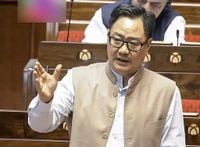In a significant parliamentary session on April 2, 2025, the Lok Sabha witnessed intense debates surrounding the Waqf (Amendment) Bill, 2024, introduced by Parliamentary Affairs Minister Kiren Rijiju. This bill, aimed at amending the Waqf Act of 1995, seeks to overhaul the management and governance of Waqf properties in India, a matter that has stirred considerable controversy among political parties and community leaders alike.
Rijiju emphasized that the bill is not just beneficial for Muslims but for the entire nation, stating, "Today is a historic day as the Waqf Amendment Bill 2025 will be presented in the Lok Sabha. I want to say clearly that this bill is not just for the benefit of crores of Muslims but for the entire nation." He added that the amendments were necessary due to changes made under the previous UPA government, which had given an overriding effect to Waqf laws over other statutes.
The proposed amendments have faced fierce opposition, particularly from the Congress party and its allies within the INDIA bloc. Congress MP KC Venugopal accused the government of rushing the bill through Parliament without allowing sufficient time for amendments, asserting, "You are forcing this legislation through without proper discussion. There must be adequate time to move amendments, but we have not been given that opportunity."
Amidst the uproar, Gaurav Gogoi, Congress's deputy leader in the Lok Sabha, articulated the party's concerns, claiming the bill undermines minority rights and is unconstitutional. He stated, "The Joint Parliamentary Committee (JPC) did not hold the necessary clause-by-clause deliberations. From the very beginning, the government's intent has been to introduce a law that is unconstitutional, anti-minority, and disruptive to national harmony."
Opposition leaders further argued that the bill could lead to the privatization of Waqf land, with Samajwadi Party President Akhilesh Yadav warning, "What could be a greater injustice than not giving importance to the voices of those for whom this bill is being introduced?" He accused the BJP of attempting to sell off Waqf land, echoing sentiments shared by various opposition members.
The Waqf Amendment Bill has provisions that would change how Waqf boards operate, including a shift from elected to nominated members, which many see as a move to centralize control. Critics, including RJD leader Tejashwi Yadav, labeled the bill as unconstitutional, expressing that it threatens the rights of Muslims, stating, "We believe in 'Ganga-Jamuni Tehzeeb', the diversity of our country is the beauty of it. From the beginning, we have opposed the Bill in both Houses of Parliament as well as the Bihar Legislative Assembly or Bihar Legislative Council."
In a counter to the opposition's claims, Rijiju asserted that the government respects all religious institutions and their autonomy, stating, "The government has no intention of interfering in any religious institution. This bill is being introduced solely to bring necessary reforms and ensure transparency." He urged the opposition to cease spreading misinformation about the bill's intentions.
Support for the bill has emerged from unexpected quarters, with the Jana Sena Party announcing its backing. Party leader Pawan Kalyan directed his MPs to support the bill, asserting that it would benefit the Muslim community. He stated, "Our party believes this amendment will be beneficial for the Muslim community."
As the debate unfolded, the Aam Aadmi Party (AAP) issued a three-line whip to its Rajya Sabha MPs, instructing them to be present from April 2 to April 4, 2025, indicating the importance of the discussions ahead. AAP leader Sanjay Singh criticized the BJP's timing, suggesting that the bill was a distraction from pressing issues such as inflation and unemployment.
On the ground, protests against the bill have been organized, with Congress MP Imran Pratapgarhi donning black attire to symbolize opposition to the amendments. He stated, "Reject Waqf Bill," as part of his demonstration outside Parliament, highlighting the palpable tension surrounding the legislative process.
In a broader context, the ongoing debate over the Waqf Amendment Bill reflects deeper societal divisions and the political landscape in India. The bill has become a flashpoint for discussions about religious rights, governance, and the role of government in managing religious properties. The opposition's united front against the bill signifies a critical stance on what they perceive as an encroachment on minority rights.
In the midst of these political maneuvers, the Uttarakhand Waqf Board Chairman Shadab Shams expressed optimism about the bill, stating, "Poor Muslims have hopes from PM Modi, and that is why we have named this amendment bill as 'Ummeed'." He characterized the bill as a beacon of hope for marginalized communities.
As the discussions continue, the future of the Waqf Amendment Bill remains uncertain, with the BJP-led National Democratic Alliance (NDA) holding a slim majority in the Lok Sabha. The outcome of the vote will likely hinge on the unity of opposition parties and their ability to mobilize dissent against the government's proposed changes.
In conclusion, the Waqf (Amendment) Bill, 2024, encapsulates the intersection of religion, politics, and governance in contemporary India. As lawmakers debate its implications, the voices of both supporters and detractors highlight the complexities of managing religious affairs in a diverse society. The coming days will be pivotal in determining not only the fate of this bill but also the broader discourse surrounding minority rights and government intervention in religious matters.








